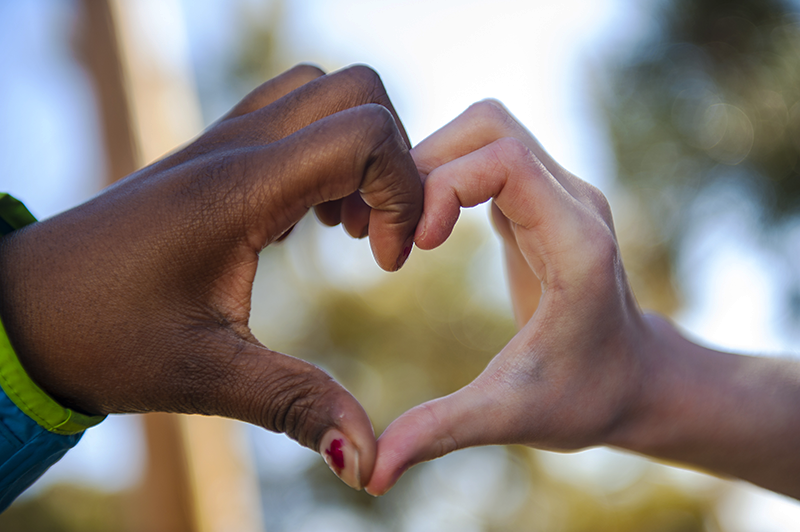Student shares his thoughts on progess of equality
By Mike Abell

In recent months there have been numerous civil rights issues that have come up across the country. Organization of Black Collegians president Ronny “Juninho” Ismaldo-Alzume believes America has made strides to overcome racism, but there’s still a lot of work to do.
Ismaldo-Alzume is originally from Portugal, where he said segregation has never occurred. He highlighted a lot of landmarks while also talking about some current issues regarding racism in America.
“We’ve made long strides to breaking the barriers for civil rights of all people,” he said. “We still have a long way to go, though. Racism still exists, even if it is a little subtle. I myself have experienced racism since living here in Overland Park …”
Ismaldo-Alzume had the chance to visit the courtroom where Brown v. Board of Education was fought. For him it was really special, although he said that the state still has a ways to go.
“Here in our own metro area, there is still a financial divide. Johnson County is one of the richest counties in the country, while in Kansas City, we still have very high rates of unemployment,” he said. “I hate to say this, but spread the wealth. Put some of that money towards helping disadvantages.”
Ismaldo-Alzume thinks that spreading awareness could prove to be one the most helpful methods to end racism on a national level. By awareness, he means making people more aware of social issues and actually researching them before deciding on a viewpoint.
“After what happened in Ferguson, Missouri, everyone thinks that was a white cop who was prejudiced. As a matter fact, he wasn’t prejudiced at all. By now, people probably think that Ferguson, Missouri is pretty much how all blacks behave. That’s not true,” he said. “We need to break down social barriers and really let people know how things really are.”
He admitted that one of the biggest problems is something that most citizens can’t change, which is economic barriers. However, another problem is social barriers, which he said anyone can help with.
“When you speak of equality for everyone, this is a country that’s having many issues with equality for everyone. Just look at same-sex marriage; that is still a big issue. Decades ago, we had to be more open-minded to blacks going to school with whites. For equality, we need to be more open-minded.”
Brian Zirkle, adjunct sociology instructor, commented on how America can take the steps toward equality for everyone.
“We have to recognize that racial inequality is the result of how our social systems function, not the result of racist individuals. We have to understand that we all perpetuate these systems, and therefore we all are part of the solution. This isn’t an African-American issue—it’s an American issue. We’re all part of it. We all have to be part of the conversation and we can’t keep saying things like, ‘I’m tired of hearing about race,’ or ‘I’m tired of talking about it.’ ”
Eight important civil rights events
- Dec. 1, 1955 – Montgomery Bus Boycott:The boycott started on Dec. 1, 1955, after Rosa Parks refused to give up her seat to a white man, initiating one of the largest demonstrations against segregation. The boycott lasted until Dec. 20, 1956, after a federal ruling was released declaring segregated buses unconstitutional.
- Sept. 4, 1957 – Little Rock Nine:Nine African-American students enrolled in Little Rock Central High School. The first day of school on Sept. 4, 1957 created a crisis after Governor Orval Fabaus ordered the National Guard not to allow them entry. However, former president Dwight Eisenhower federalized the National Guard and had members of the 101st airborne escort the students into school on Sept. 25, 1957.
- May 17, 1954 – Brown v. Board of education:It was ruled by the Supreme Court that having segregated schools was unconstitutional due to the 14th Amendment.
- May 4, 1961 – The Freedom Riders:The Freedom Riders was a group of 13 civil rights activists who boarded a bus on May 4, 1961 and made a series of bus trips through the South to protest segregated interstate bus terminals.
- Aug. 28, 1963 – March on Washington:Approximately 250,000 people marched to the Lincoln memorial. Multiple people spoke, and near the end, Martin Luther King Jr. delivered his “I Have a Dream” speech.
- January 1964 – 24th Amendment passed:The 24th Amendment was passed, which outlawed the poll tax that African-Americans were forced to pay before voting. African-American voter registration immediately increased.
- Aug. 6, 1965 – Voting Rights Act approvedThe Voting Rights Act eliminated the literacy test which African-Americans were required to take before voting.
- March 1965 – Selma to Montgomery March:Martin Luther King Jr. led a 54-mile march despite multiple violent interventions from the police. The march was meant to support registration for black voters.






















